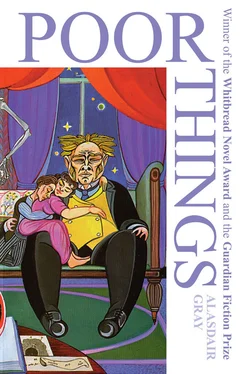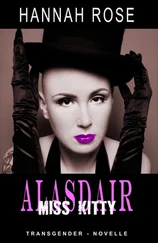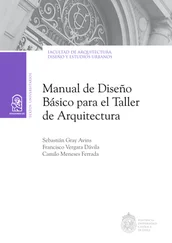When Victoria and Archibald opened the Natal Clinic in 1890 they put all Baxter’s money into the fund supporting it. The managing committee contained Sir Patrick Geddes and Principal John Caird of Glasgow University. By 1920 these had been replaced by weaker people who now bowed before the storm of unfriendly publicity. They sacked Victoria and gave the clinic to Oakbank Hospital as an out-patients department. Dr. Victoria had spent her savings printing, distributing and advertising A Loving Economy , so her only remaining property was 18 Park Circus. All Baxter’s old servants were dead by now. She let the upper rooms to university students and withdrew to the basement where she continued what she still called The Godwin Baxter Natal Clinic on a much smaller scale.
From then until 1923 she was chiefly noticed for her support of John Maclean. In a letter to C. M. Grieve (Hugh MacDiarmid) she wrote:
I cannot like the orthodox communists. They have one simple answer to every question and believe (like the fascists) that they can forcibly simplify what they do not understand. In any discussion with one I feel I am facing a bad school teacher who wants to shut me up. Maclean is a good school teacher.
When Maclean did not join the newly formed British Communist Party but founded the Scottish Workers’ Republican Party she offered him her home as a meeting place. When he died of overwork and pneumonia in 1923 she made a short speech by his graveside. His daughter, Nan Milton, recorded it in a letter, and Archie Hind quotes it at the end of his play about Maclean, Shoulder to Shoulder.
John was not a Zapata, galloping on horseback over the corn-fields. He was of the peasantry who fed Zapata. He was not a Lenin, working to move his office into the Kremlin. He was of the Kronstadt sailors whose mutiny gave Lenin the chance. John was not the sort who lead revolutions. He was the sort who make them.
The Daily Express put another reporter onto her two years later, perhaps hoping to find more conclusive evidence of illegal abortions, but the article which came out of this was a short character sketch, probably because nearly everyone who now remembered “Dr. Vic” thought she was dead. The reporter learned that children of the area called her The Dog Lady, because she walked around the West End Park accompanied by dogs of many sizes, some of them bandaged. The clinic was entered from the back lane, and the ground on each side of the path was overgrown with rhubarb plants. The waiting-room was crammed with heavy mid-Victorian seating, particularly a huge horse-hair-covered sofa. The only wall decorations were old posters for the Scottish Workers’ Republican Party. There was also a heavy padlocked box with a slit in the lid and a notice pinned to the side saying Put what you can afford in here — it will not be wasted. If you are hungry please do not steal this but speak to me in the surgery — hunger is curable. Half the people waiting looked very poor and old. The rest seemed to be children with animals, mostly dogs. There was only one pregnant woman.
When the reporter was admitted to the surgery he found it was a huge gas-lit kitchen with a pot of soup simmering on the fire range, various animals reclining in corners, and a tall, straight-backed woman sitting at a kitchen table laden with books, papers and medical instruments. She wore a white apron which covered her body from neck to ankles, with white celluloid cuffs attached to the black sleeves of her dress. Her strangely unlined face could have been any age between forty and eighty. When the journalist sat down facing her she said at once, “You look like a newspaper reporter. Is it the Daily Express ?”
He said yes, and hoped she would not mind answering some questions. She said, “Of course not, if you pay for my time on the way out.”
He asked her if all her patients paid her in that voluntary way. She said, “Yes. They are poor people, or children. How can I judge what they are able to pay me without hurting themselves?”
He asked if she always gave money to hungry beggars. She said, “No. I give them soup.”
He asked if her veterinary work had not reduced her number of human patients. She said, “Undoubtedly. The human animal is prone to silly prejudices.”
He asked if she preferred dogs to human beings. She said, “No, I am not that kind of sentimentalist. I will always feel tenderness toward my own silly prejudiced species. But nowadays folk with sick animals shun me less than sick humans.”
He asked if there was anything in her life she sincerely regretted. She said, “The Great War.”
He told her she had misunderstood him — he meant, did she regret something for which she felt personally responsible? She said, “Yes. The Great War.”
He asked what she thought about de Valera’s Irish republic, the short length of young women’s skirts, Mairzy Doats and Dozy Doats (a popular song of the time) and Trotsky’s expulsion from the Russian Communist Party. She said, “Nothing. I no longer read newspapers.”
He asked if she had a message to give to British youth. She smiled brightly and said that for five pounds she would give him a very quick little answer summing up all she thought good in life, but she wanted the money first. He gave her five pounds. From a pile at her elbow she handed over a little hardbound copy of A Loving Economy , bade him good-bye and ushered him out.
That article is the only record of Victoria McCandless between 1925 and 1941, apart from her name and address in Kelly’s street directory.
The Second World War revived for a while both the industrial and intellectual life on Clydeside. Glasgow was the main transit port between Britain and the U.S.A. The bombing of south Britain inclined many to the northern industrial capital. The painter J. D. Fergusson returned here with his wife, Margaret Morris. They had known Dr. Victoria in her younger days, and Margaret Morris rented an upper floor of 18 Park Circus as a rehearsal space for her Celtic Ballet Company. Until 1945 the house became one of several unofficial little arts centres flourishing on or near Sauchiehall Street. The painters Robert Colquhoun, Stanley Spencer and Jankel Adler briefly lodged in it or visited it. So did the poets Hamish Henderson, Sidney Graham and Christopher Murray Grieve, better known as Hugh MacDiarmid. In his autobiography The Company I’ve Kept (published in 1966 by Hutchinson & Co.) MacDiarmid says:
I seem to have been the only one there who knew that the queer old landlady lurking in the basement was the one female Scottish healer — apart from Long Mairi of the Glens — whose name could have been proudly inscribed beside Madame Curie, Elizabeth Blackwell and Sophia Jex-Blake. Perhaps her pets’ hospital frightened away the lily-livered, but her Scotch broth was excellent, and ladled freely out with a lavish hand.
He reviles:
our cowardly Scottish medical establishment which could easily have given her a university lectureship in gynaecology, but was scared out of its wits by the English gutter press led by that analphabetic hoodlum, Beaverbrook.
This last statement is perfectly true, but would have been more persuasive if expressed more politely. We must be grateful to MacDiarmid, however, for quoting in full a letter she wrote shortly before her death. A lesser man would have suppressed it, as it said things he certainly did not like. Though undated it was obviously written soon after the 1945 general election.
Dear Chris,
So at last, for the first time this century, we have a Labour government with an overall working majority! I will start reading the newspapers again. Britain is suddenly an exciting country. The anti-trade-union laws of 1927 are being repealed and it seems we WILL get social welfare and national health care for all, and Fuel and Power and Transport and Iron and Steel WILL become Public Property! As Public as broadcasting, telephones, tap-water and the air we breathe! And we WILL jettison that millstone round our necks, the British Empire! Do you not feel a little happier, Chris? I feel a lot happier. We are setting the world a finer example than the Soviet Union ever did. I feel that everything between 1914 and the present day has been proved a hideous detour, a swerving from the good path of social progress whose last fixed point was the Lloyd George budget which abolished poor-houses by the old-age pension, and started breaking up the enormous estates by death duties. It seems John Maclean was wrong. A workers’ co-operative nation will be created from London, without an independent Scotland showing the way.
Читать дальше












